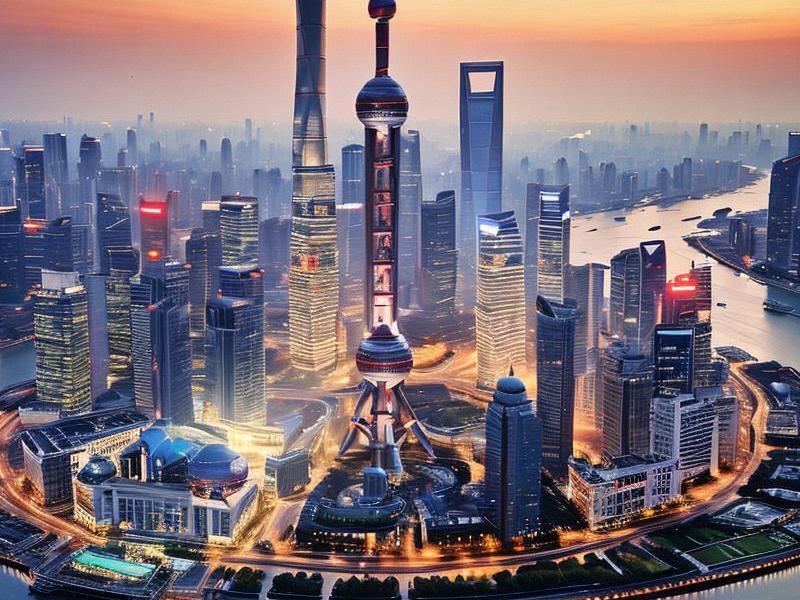
Shanghai, a city that has long been a symbol of China's economic prowess, is undergoing a profound metamorphosis. Once renowned for its bustling markets, historic architecture, and as a gateway to the world, Shanghai is now at the forefront of global innovation, blending tradition with cutting-edge technology.
The city's journey began in the late 19th century when it was forcibly opened to foreign trade, becoming a melting pot of cultures and ideas. This historical backdorplaid the foundation for Shanghai's evolution into a modern metropolis. However, it was in the late 20th century that the city truly began to shine on the global stage.
In the 1990s, the Chinese government launched the Pudong New Area project, a bold initiative to transform the eastern part of Shanghai into a world-class financial and commercial center. This project marked a turning point in Shanghai's development, as it attracted massive investments from both domestic and international sources. Skyscrapers began to rise, and the city's infrastructure underwent a massive upgrade.
Today, Pudong is home to some of the world's tallest buildings, including the iconic Oriental Pearl Tower and the Shanghai Tower. These architectural marvels are not just symbols of Shanghai's economic might but also reflect the city's ambition to become a global leader in innovation and technology.
One of the key drivers of Shanghai's transformation has been its focus on innovation and technology. The city has invested heavily in research and development, fostering a vibrant startup ecosystem. Silicon Valley may be the birthplace of the tech revolution, but Shanghai is fast emerging as its Asian counterpart.
爱上海同城419 The Zhangjiang Hi-Tech Park, often referred to as China's "Silicon Valley," is a testament to Shanghai's commitment to innovation. This park houses numerous high-tech companies, research institutions, and universities, creating a fertile ground for technological advancements. It has become a hub for startups, attracting talent from all over the world.
Shanghai's tech scene is not limited to Silicon Valley. The city has also embraced the digital economy, with e-commerce and fintech companies thriving in the business-friendly environment. Companies like Alibaba and Tencent have established significant operations in Shanghai, further cementing the city's position as a global tech hub.
In addition to its technological advancements, Shanghai has also made significant strides in urban development. The city has implemented smart city initiatives, integrating technology into every aspect of urban life. From intelligent transportation systems to digital governance, Shanghai is leading the way in creating a more efficient and sustainable urban environment.
One of the most notable examples of Shanghai's smart city initiatives is the city's public transportation system. The Shanghai Metro, one of the busiest and most advanced metro systems in the world, has undergone numerous upgrades to incorporate smart technology. Real-time tracking, mobile payment options, and automated ticketing systems have made commuting more convenient for residents.
上海龙凤sh419 The city's commitment to sustainability is also evident in its efforts to reduce carbon emissions and promote green energy. Shanghai has set ambitious targets to become a low-carbon city by 2040, with plans to increase the use of renewable energy sources and improve energy efficiency. The city has also invested in green infrastructure, such as urban forests and green roofs, to enhance the quality of life for its residents.
Culturally, Shanghai remains a vibrant and dynamic city, blending tradition with modernity. The Bund, a historic waterfront area, offers a glimpse into the city's colonial past, with its charming architecture and beautiful views of the Huangpu River. At the same time, areas like the French Concession showcase the city's cosmopolitan culture, with its trendy cafes, art galleries, and boutique shops.
Shanghai's cultural scene is not limited to its historic districts. The city hosts numerous festivals and events throughout the year, attracting visitors from all over the world. From the Shanghai International Film Festival to the Shanghai Fashion Week, these events highlight the city's rich cultural heritage and its embrace of modernity.
Education is another area where Shanghai has made significant strides. The city is home to some of the best universities in China, including Fudan University and Tongji University. These institutions are not only centers of academic excellence but also play a crucial role in fostering innovation and entrepreneurship.
419上海龙凤网 Shanghai's transformation is not without its challenges. The rapid urbanization and economic growth have brought about issues such as housing shortages, traffic congestion, and environmental concerns. However, the city government has been proactive in addressing these challenges, implementing policies to promote sustainable development and improve the quality of life for its residents.
One of the key strategies employed by the city is the development of satellite cities and suburban areas. These new developments aim to alleviate the pressure on the city center, providing residents with more affordable housing options and reducing traffic congestion. The city has also invested in public transportation infrastructure, expanding the metro network and improving bus services to make commuting more convenient.
In conclusion, Shanghai's journey from a traditional metropolis to a global innovation hub is a testament to the city's resilience and adaptability. Through its focus on innovation, urban development, and cultural preservation, Shanghai has positioned itself as a leader in the global arena. As the city continues to evolve, it remains a beacon of hope and opportunity for millions of people around the world.
